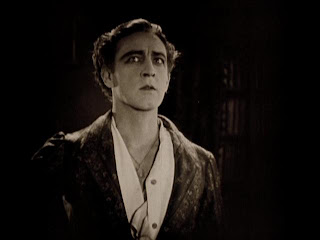”A man cannot destroy the savage in him by denying its impulses. They only way to get rid of a temptation is to yield to it.”
Dr. Jekyll (John Barrymore) is a scientist with a heart of gold yet something dark and malicious lurks in his nature, ultimately bringing ruination upon him when he goes looking for it. He begins as a fairly mild character, helping the poor and unfortunate and finding love with a kind young woman. Troubles arises when her father takes him to a dance hall in the seedier part of town and Jekyll finds himself attracted to a dancer (Nita Naldi), awakening within him a hunger that makes him fear for his soul. He is tempted though and in order to secure his immortal salvation as well as indulge these stirred passions, he endeavours to separate man’s two halves.
Let me admit up front that I did not enjoy this movie. I thought it would be fun to watch a silent version of Dr. Jekyll and Mr. Hyde as I’d watched several other versions and wanted to see how this one measured up. Click here to see what I thought of the 1932 Rouben Mamoulian version with Fredrich March. As for this film, I was left feeling disappointed. John Barrymore plays Jekyll and Hyde and is really the only stand out part about the movie. Everything else from the other actors, to the sets to the lighting and cinematography is sub-par and felt like background noise. I did like that this version has Jekyll as a greyer character than a complete goody-goody. Other versions I’ve watched were either all about the science aspect of the experiment or about expunging man of his evils. This version has Dr. Jekyll wanting to experience his base desires without endangering his soul, essentially exploiting a loophole to get what he wants. This creates a more complex character and makes his actions and dialogue more interesting to watch.
Barrymore is another story entirely. He is THE ham in this film. While I understand that silent movies don’t allow for subtlety or nuances like tone of voice and volume, his performance was over the top. When transforming into Hyde, Barrymore practically falls over while pin-wheeling his arms, teetering on the melodramatic. I actually laughed during these parts, a reaction that I’m sure was not intended. To be fair though, I thought Hyde looked fantastically creepy with those sharp teeth and that elongated skull. In several shot he stalks up to the camera like a manic beast, looking directly at the audience, which made me uncomfortable and I loved it! As Jekyll he’s rather bland and is either scowling and/or wide-eyed with a crazy look on his face. Hyde is definitely the more fun part to play but it’s taken to its extreme, leaving the audience with an overdone performance. This is especially true when you take into consideration how many profile shots he has in this film. It adds nothing to the story and I would much rather have seen more about Jekyll's struggle to resist giving in to his desires before making the potion. We only really get that one scene where Nita Naldi's character is draped over him and you can see how close he is to giving in. My main disappointment with the film is that I’ve seen Barrymore in ”Grand Hotel” where he was absolutely marvelous. Here he’s a garish clown and I know he’s capable of much more. The one saving grace is that this film was early in his career and with his experience as a stage actor, he would, I imagine, be more used to dramatic gestures that would communicate to every audience member, even those in the back.
The plot was a little difficult to follow. I loved the title cards, what few there were because most had pictures on them, making them more dynamic than one would usually expect to find. The problem came when I got further into the movie and there are fewer and fewer title cards. In some parts I had to guess what was going on. For example, the scene where Hyde stops off at a bar and paws at several women was great but I have no idea what he was saying to them or what the scene with the mirror was about. It can be fun to try and interpret what's going in a film but the risk is that you will lose the audience. There were some great scenes though. One involved a child that I thought was very bold for 1920. Also, I enjoyed the confrontation scene between Jekyll and his girlfriend’s father. There’s a somewhat similar scene in ”The Man Who Shot Liberty Valance”. Then there’s the scene with the spider. A double exposure shot shows this ghostly gigantic spider creeping up onto Jekyll’s bed as he sleeps, supposedly a nightmare and possibly a manifestation of the evil that has taken hold of him.
What suffered the most in this movie was the score, which was atrocious and ruined several parts of the film. Consisting entirely of organ music it contained neither nuance nor subtlety. In several places that called for sad and meaningful music there was a gregarious, cheerful tune that couldn’t have been more out of place. I wasn’t able to find any information about whether the score was original to the movie or a later addition but let me just say that it was entirely inappropriate. I can only hope that one day some composer will re-score this film with far more care and attention to the subject matter.
Overall I would only recommend this film to die-hard Barrymore fans. As a Jekyll and Hyde adaptation, it's not worth watching.



No comments:
Post a Comment